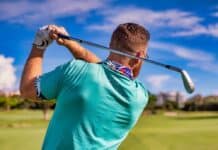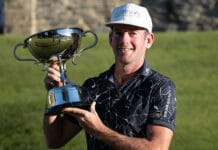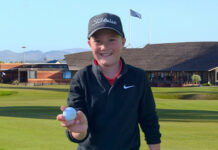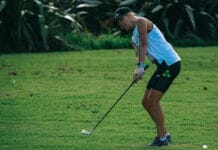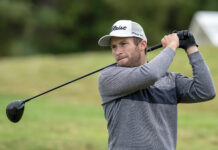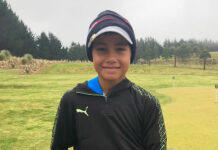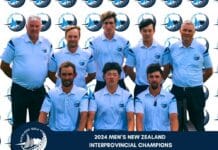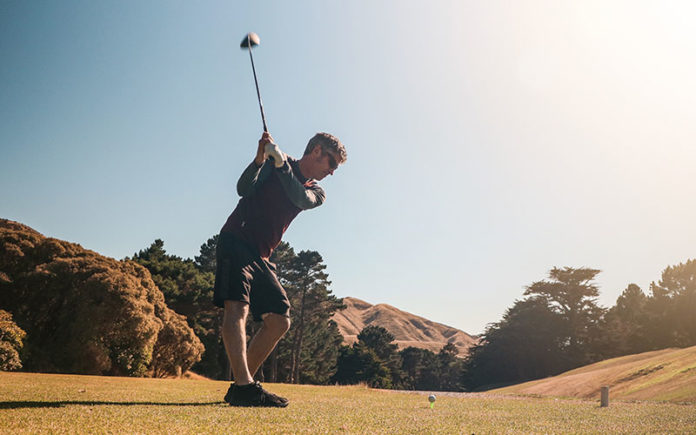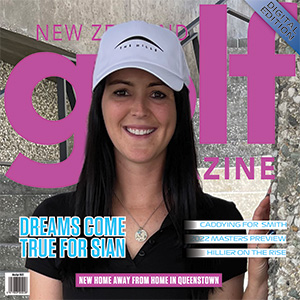Andrew Leslie stops and steadies himself to take a look around. He wants to soak it all in.
He’s on the first tee at the Karori Golf Club in Wellington in the mid-afternoon sun and he’s surrounded by silence. It is remarkable.
The 48-year-old nervously steps up to the tee – it has been a while since he’s hit a golf ball – and hits his drive with a swing that is a little bit rusty.
“That has got to be the best feeling in golf,” he says with a smile, as his ball flies down the fairway.
He picks up his walking sticks and begins his round, one step at a time. There is no-one around and in the backdrop he can hear the acoustic ripple of the creek and native birds talking to one another.
“I can’t tell you how much I’ve missed this,” he says. “Being in places like this, well it’s incredible and good for the soul. I love golf. I have never been great at it but I love the game … maybe now it will be more of a focus for me.”
In the last 12 months, Leslie has had to change the focus of his entire life.
On 19 March 2020 he became a tetraplegic – since then his recovery has been nothing short of remarkable.
“I wish I’d taken the other route”
One year ago to the day, Leslie’s life changed forever when he was mountain biking at Mākara Peak.
A week out from New Zealand’s first lockdown, the CEO of Recreation Aotearoa was riding down a Grade 4 track. There was a fork in the track where riders veer right to go over a drop or left to avoid it.
“It was a split-second decision; I’d been over it before, so I guess it was instinctive to veer right,” he says.
“There are so many times where I’ve thought about that moment and wished I’d taken the other route. How life could have been so different.”
At the edge of the drop, Leslie’s balance was off and his front wheel not in line. He went over the handlebars and landed on his head on a rock. His body went numb instantly.
Leslie drew breath to make the loudest noise he could to alert the next person coming down the track so they wouldn’t land on top of him.
Soon after Leslie was surrounded by paramedics and he heard a helicopter overhead.
“I knew what it meant when they told me I was going straight to Christchurch, something was seriously wrong with my spine,” he says.
The Life Flight Trust helicopter landed in Hagley Park, and Leslie was taken straight into hospital for scans and then surgery. It is all one big blur.
Leslie was transferred to the Intensive Care Unit (ICU) and was fighting for his life.
“When I woke up, three weeks later, the world had changed,” he says.
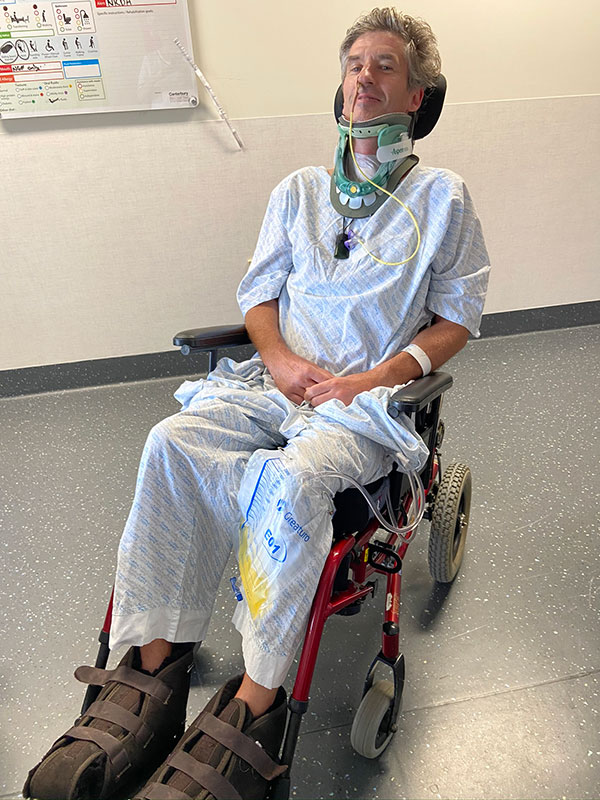
‘Have a Hmmm’
Serious injuries like Leslie’s are happening every day in New Zealand.
ACC accepts two million claims injury per year, more than 5,000 claims a day, which cost more than $4 billion annually.
Helping Kiwis avoid these injuries is the key driver for ACC’s newly launched campaign called ‘Preventable’.
The campaign will look to decrease the number of injuries and reduce the severity of injuries. It aims to improve the wellbeing of all New Zealanders at home, work and play.
ACC Head of Injury Prevention Isaac Carlson says it’s estimated 90 per cent of injuries aren’t random, unconnected or unpredictable – they are predictable and therefore preventable.
“People can avoid most injuries by taking a moment to think – have a Hmmm,” says Carlson.
“It is all about taking a moment to think about what you’re about to do, what could go wrong and taking action to make sure it turns out well. If you get hurt, others you care about are also harmed.
“We want New Zealanders to enjoy their lives and have fun with their whanau and friends and we want to put the wero (challenge) out there. We can all prevent most harm happening in the first place.”
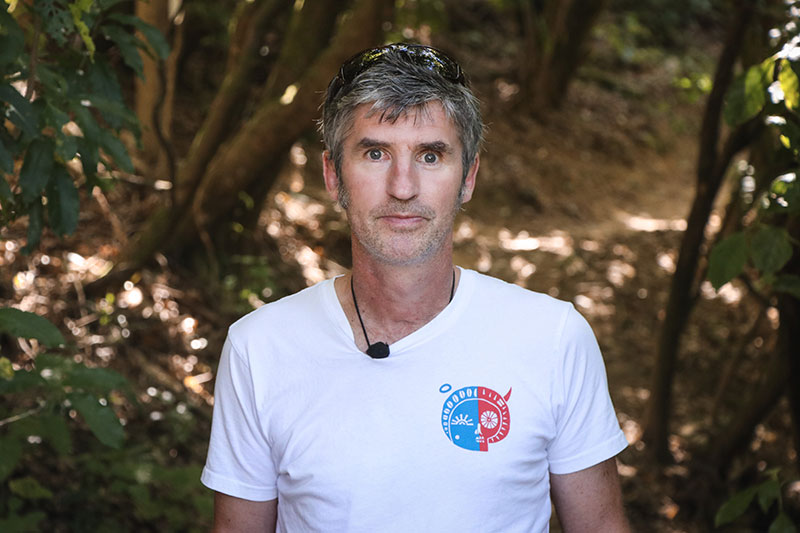
The long road to recovery
Leslie had injured his neck between the C4 and C5 vertebrae. A disc shot forward and crushed his spinal cord. There were also fractures and snapped ligaments.
They removed the disc, took a bone graft from his hip, put that in between the vertebrae, bolted it together with a metal plate and left it to stitch together.
Leslie was told he was now tetraplegic.
“That term is quite scary,” he says. “My family was hearing that term, and what they were seeing was scary too. I was lying in an induced coma with tubes coming out of my mouth and nose. They were being prepared by doctors that I’d likely be in a wheelchair for the rest of my life.”
It was a fate that he never accepted.
From the outside, Leslie looked completely asleep, but he was far from it.
“My brain was going crazy with dreams, hallucinations and visions,” he says. “Talk of this crazy new pandemic world was coming through into my dreams.”
In the second week, Leslie started to wake up and wanted to tick off his first milestone of breathing by himself.
“They call it ‘sprints’ – three times every day the ventilator was dialled down, forcing me to work harder with my breathing.”
When his diaphragm and muscles around his lungs were strong enough, he was taken off the ventilator.
“I set the goal to walk out of this place”
In Leslie’s post ICU assessment, the doctor noticed a flicker of movement starting to happen in his legs.
“I allowed myself to think, ‘maybe I’ll walk again’. And off I went to Burwood Hospital to start my rehab.”
Leslie says the awakening of his muscles was “hugely positive” and the days were filling up as rehab started.
“But there were dark times too. I didn’t sleep much, and my mind started to wander to; ‘What’s going to become of me… what if…. why didn’t I take that bailout rather than turning right?’ I was frustrated with the feeding tube in my nose, necessary due to the damage done to my throat during the operation,” he says.
New Zealand was in a Level 4 lockdown. In ICU his wife was able to visit for an hour each day but in Burwood there were basically no visitors. His fellow patients, aged 16 – 81, mostly blokes, were in their own bubble.
“We had nothing to do but bond together and I formed relationships there which will be with me for life.”
Leslie is a visualiser. He set to work visualising a particular muscle engaging, over and over for hours.
He reached milestones like scratching his head and brushing his teeth and set bigger goals.
“I wanted to walk out of this place, and I wanted to walk well – well enough to walk in the bush. I wanted to play chords on the guitar and play the piano again,” he says.
It was slow progress. At first, he learned how to stand up, to get out of his chair and then taking his first steps.
“I’d look down at my feet and not know what to do. I walked with the physio’s help, then with crutches, really starting to engage my brain. I then walked with a stick, then on my own.”
Leslie achieved his goal of walking out of Burwood Hospital which was an emotional moment.
“It was the hardest thing I’ve ever done, to learn to walk again. I’m immensely proud of that.”
For the final stage of his rehabilitation at Burwood Leslie flatted with three others from the Spinal Unit where he was learning to be independent.
He wanted to walk; on rough tracks, up hills, out in the great outdoors.
“I gave my crutches a good work out,” he says. “I also went to a driving range – my swing was probably just as bad before the accident, but it was good to know I could still swing a golf club.”
“Incredible recovery beyond expectations”
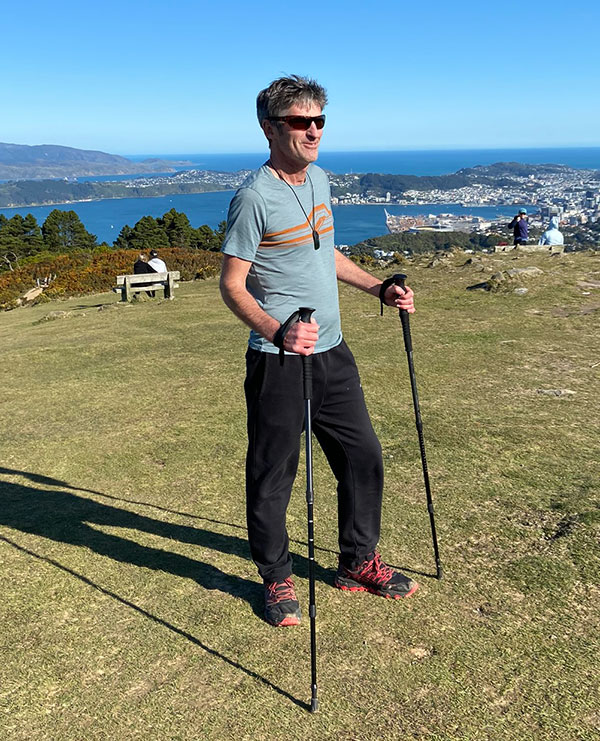
Leslie’s ACC Recovery Partner Sharon Smith says Andrew, ever since he regained consciousness, has been totally committed to his recovery.
“I found a quote from his medical notes which sums him up to a tee, ‘Andrew has been a model rehab patient at Burwood, always achieving beyond early expectations’.”
Smith says it is “an amazing recovery” story of mind over matter, which is all about Leslie’s resilience and positivity.
“Despite having suffered a very serious spinal injury, Andrew managed to return to his pre-injury role, working full-time barely eight months after being on life support in ICU. That’s incredible.”
She says Leslie’s story is a great example of mind over matter.
ACC has played a leading role in Leslie’s rehabilitation. His list of support includes; surgery and rehab, housing modifications such as putting in handrails at his home, orthotics (for walking), psychological support, transport support, nursing and home care assistance, and weekly compensation.
“It was remarkable that he got back to work so quickly and it has been great for his recovery,” says Smith. The workplace is often the best place to recover from an injury because of the physical, personal and social benefits it provides.”
“ACC have been an incredible support in my recovery,” says Leslie. “It is a huge relief to know that all of your expenses and rehab is taken care of so you can focus on getting back to work and living independently.”
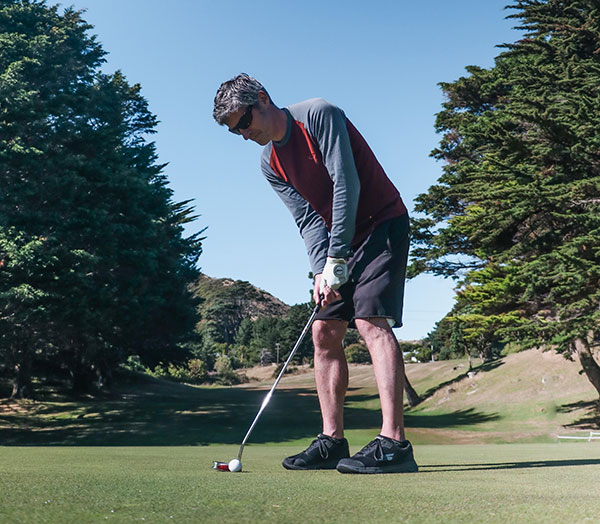
Getting back to reality
Back to the real world and it was overwhelming. Leslie had his family, his job and his recovery to juggle. He went from having physio twice a day in hospital to twice a week.
“It has been a reset time and a time to set and reach new goals. My goals are always aspirational, I couldn’t wait to get back in nature. Being back on a golf course was always a goal.”
Leslie says he is seeing the world differently now. One in four New Zealanders have a disability and Leslie wants to work with the Department of Conservation to make tracks more accessible all over Aotearoa.
“I still grieve for the things that I used to do be able to do – I would love more than anything to go mountain biking with my daughter – but I refuse to wallow in that.
“There are potential upsides. I’m the type of person who will use my influence to amplify this. I am now, and always will be a C4/C5 ASIA D tetraplegic, but I am still me. I’m the same, but a little bit different and I want to make a difference.”
And of course, he wants to work on his handicap. Watching the sun go down on Karori Golf Club with a cold drink in hand, Leslie is a happy man.
“I can’t mountain bike or trail run like I used to so being out here, playing golf is awesome. It’s pretty special to still be able to do this.”
What is Preventable?
- Preventable is an injury prevention campaign from ACC which lays down a wero (challenge) to all New Zealanders to stop and take a moment to assess the risks at home, work and play.
- Preventable will look to improve the quality of life and wellbeing of all New Zealanders by reducing the incidence and severity of injury.
- You can do something to avoid hurt to you and harm to others by having a hmmm – take a moment to make sure what you’re doing turns out well.
‘Preventable’ by the numbers
- ACC accepts over two million injury claims per year, that is over 5,000 injury claims a day
- These claims come at an annual cost of $4 billion
- It is estimated that 90% of all injury claims are preventable
- ACC invests around $80 million per annum into Injury Prevention



